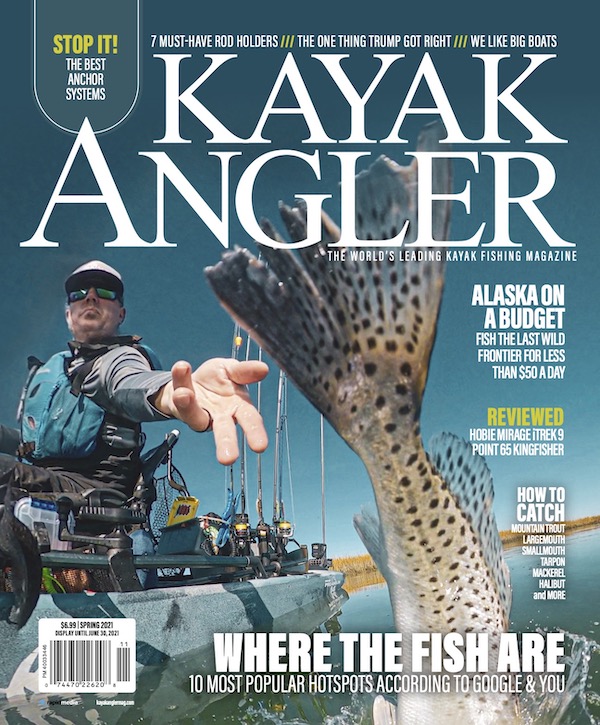I can keep five speckled trout, four grey trout or an unlimited number of sand trout. Why? Did you ever wonder who sets fishing regulations? How does anyone count fish? Then, who decides the rules? The Modern Fish Act introduces some changes that could be good news for recreational anglers.
Modern Fish Act Aims for New Balance
For more than 40 years, the federal government has relied on the Magnuson-Stevens Management Act to set fishing regulations. But the outdated rules favored commercial fishing over recreational fishing. Last year, then President Donald Trump signed the Modernizing Recreational Fishing Act, or Modern Fish Act, to even the playing field.
To determine fish populations, scientists use a variety of tools from sample surveys to angler surveys to estimate the stock of a specific species. Once fisheries managers have this number, it’s up to the government to split up the harvest between commercial and recreational anglers.
Since 1976, the government has relied on the Magnuson-Stevens Management Act to set regulations. This legislation favored other interests, such as commercial and conservation, over recreational anglers.
Jeff Angers, president of the Center for Sportfishing Policies, explains the problem with Magnuson-Stevens: “For generations, the recreational fishing sector has been an afterthought.” With 10 million Americans fishing for fun, the recreational sector has grown to be a powerful player in fisheries management. Angers argues, “Recreational anglers contribute $68 billion to the economy and support 475,000 jobs; they shouldn’t be an afterthought.”
The Modern Fish Act
contains eight sections:
- Outlines a process for allocation review
- Alternative fishery management
- Moratorium on limited access privilege programs
- Rebuilds overfished and depleted fisheries
- Modifies annual catch limit requirements
- Sets policies for commercial exempted fishing permits
- Creates cooperative data collection
- Modernizes data collection
With a stated intention, “to modernize recreational fisheries management,” the Modern Fish Act includes interests related to recreational fishing. The groundbreaking act contains eight sections including new processes for determining allocations and improving data collection. New rules will put emphasis on mixed-use fisheries where commercial and recreational interests vie for portions of the same pie.
According to Neal McMillin, legislative assistant to Senator Roger Wicker (R-Mississippi), one of the bill’s sponsors, “The Modern Fish Act is something practical to address the needs of recreational fishermen without stepping on the toes of commercial or charter anglers.” Before these protections, commercial and conservation interests were able to gain a larger share of the catch limits.
Data Collection is Key for Conservation
One of the most important objectives is improved data collection. To see the importance of accurate catch statistics, look at Gulf Coast red snapper management. Jeff Angers from the Center for Sportfishing Policy explains, “In 2017, red snapper season was cut to three days.” Red snapper are one of the most popular fish for recreational and commercial anglers, and the strict regulations were the result of overharvest. Angers says, “Gulf anglers plan their whole summer around red snapper, these fish are the filet mignon of the sea.”
“The Modern Fish Act is something practical to address the needs of recreational fishermen without stepping on the toes of commercial or charter anglers.”
To remedy the situation, regional representatives developed partnerships with the Federal Government to manage the fishery. As a result, more accurate data was collected and allocations more evenly split. “The next year we had 108 days to fish for red snapper,” Angers says. The Modern Fish Act will mirror this success by more equitably dividing the catch.
Other sections of the Modern Fish Act put provisions in place to ensure the recreational angling community receives a fair share of fisheries allocations. Studies will be conducted to ensure fisheries allocation and processes are adequate. When a population is considered overfished, the recreational community will also shoulder a fair share of the burden. Then, further plans are in place to rebuild depleted populations. In addition, the new law puts a moratorium on the limited access privilege program that allows commercial anglers special access to fisheries.
To set a stage for the future, the Modern Fish Act has processes in place for fisheries disasters, such as the current COVID-19 pandemic.
Neal McMillin from Senator Wicker’s office explains, “We’re seeing a need to provide relief to the recreational and commercial fishing community as COVID-19 has impacted the industry. The Modern Fish Act does this.”
Recreational Anglers Gain Seat at the Table
As recreational anglers contribute more dollars to the economy, their impact on fisheries management will increase. We’re no longer playing second fiddle to commercial and conservation interests. The Modern Fish Act is a powerful sign the fish belong to everyone.

More people fishing for fun leads to more influence with policy makers. | Feature photo: Donald J. Trump Presidential Library






